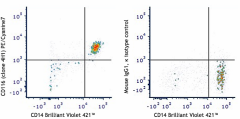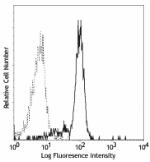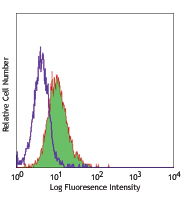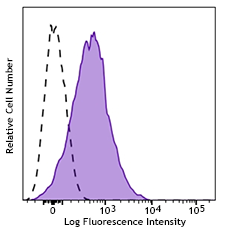- Clone
- 4H1 (See other available formats)
- Regulatory Status
- RUO
- Other Names
- GM-CSFRα chain
- Isotype
- Mouse IgG1, κ
- Ave. Rating
- Submit a Review
- Product Citations
- publications

-

Human peripheral blood monocytes were stained with CD14 Brilliant Violet 421™ and CD116 (clone 4H1) PE/Cyanine7 (left) or Mouse IgG1, κ isotype control PE/Cyanine7 (right) and True Stain Monocyte Blocker™. -

Human peripheral blood monocytes were stained with CD14 Brilliant Violet 421™ and CD116 (clone 4H1) PE/Cyanine7 (left) or Mouse IgG1, κ isotype control PE/Cyanine7 (right) without True Stain Monocyte Blocker™.
| Cat # | Size | Price | Quantity Check Availability | Save | ||
|---|---|---|---|---|---|---|
| 305909 | 25 tests | 141€ | ||||
| 305910 | 100 tests | 324€ | ||||
CD116 is a 70-85 kD α chain of the GM-CSF receptor. It combines with CDw131 β chain to form the high affinity GM-CSF receptor. A soluble form of CD116, which binds GM-CSF with a relatively low affinity, has been identified. In addition, an alternatively spliced form of CD116 with an altered cytoplasmic tail has been described. CD116 is expressed on various myeloid cells including monocytes, macrophages, neutrophils, eosinophils, dendritic cells and their precursors, fibroblasts, and endothelial cells. CD116 is expressed on myeloid leukemias, osteogenic sarcoma cell lines, osteoblast-like cells and breast and lung carcinoma cell lines.
Product DetailsProduct Details
- Verified Reactivity
- Human
- Reported Reactivity
- African Green
- Antibody Type
- Monoclonal
- Host Species
- Mouse
- Immunogen
- Human GM-CSFRα transfected COS cells
- Formulation
- Phosphate-buffered solution, pH 7.2, containing 0.09% sodium azide and BSA (origin USA)
- Preparation
- The antibody was purified by affinity chromatography and conjugated with PE/Cyanine7 under optimal conditions.
- Concentration
- Lot-specific (to obtain lot-specific concentration and expiration, please enter the lot number in our Certificate of Analysis online tool.)
- Storage & Handling
- The antibody solution should be stored undiluted between 2°C and 8°C, and protected from prolonged exposure to light. Do not freeze.
- Application
-
FC - Quality tested
- Recommended Usage
-
Each lot of this antibody is quality control tested by immunofluorescent staining with flow cytometric analysis. For flow cytometric staining, the suggested use of this reagent is 5 µL per million cells in 100 µL staining volume or 5 µL per 100 µL of whole blood.
True-Stain Monocyte Blocker™ is needed in order to minimize non-specific staining of monocytes. - Excitation Laser
-
Blue Laser (488 nm)
Green Laser (532 nm)/Yellow-Green Laser (561 nm)
- Application Notes
-
Additional reported applications (for the relevant formats) include: immunoprecipitation2, Western blotting1, and immunohistochemical staining of acetone-fixed frozen tissue sections4 and paraffin-embedded tissue sections5.
- Application References
-
- Stomski FC, et al. 1998. J. Biol. Chem. 273:1192. (WB)
- McClure B, et al. 2001. Blood 98:3165. (IP)
- Guthridge MA, et al. 2004. Blood 103:820.
- Xiong S, et al. 2013. J. Clin. Invest. 123:4264. (IHC)
- Sawada H, et al. 2014. J. Exp. Med. 211:263. (IHC).
- RRID
-
AB_2819933 (BioLegend Cat. No. 305909)
AB_2819934 (BioLegend Cat. No. 305910)
Antigen Details
- Structure
- Ig superfamily, type I transmembrane glycoprotein, associates with CDw131, 70-85 kD
- Distribution
-
Monocytes, granulocytes, dendritic cells, endothelial precursors
- Function
- Myeloid hematopoietic cell proliferation, differentiation
- Ligand/Receptor
- GM-CSF
- Cell Type
- Dendritic cells, Endothelial cells, Granulocytes, Monocytes
- Biology Area
- Immunology
- Molecular Family
- CD Molecules, Cytokine/Chemokine Receptors
- Antigen References
-
1. Miyajima A, et al. 1993. Blood 82:1960.
- Gene ID
- 1438 View all products for this Gene ID
- UniProt
- View information about CD116 on UniProt.org
Related FAQs
Other Formats
View All CD116 Reagents Request Custom Conjugation| Description | Clone | Applications |
|---|---|---|
| FITC anti-human CD116 | 4H1 | FC |
| PE anti-human CD116 | 4H1 | FC |
| Purified anti-human CD116 | 4H1 | FC,IP,WB,IHC-P,IHC-F |
| PE/Cyanine7 anti-human CD116 | 4H1 | FC |
| TotalSeq™-A0940 anti-human CD116 | 4H1 | PG |
| APC anti-human CD116 | 4H1 | FC |
| TotalSeq™-D0940 anti-human CD116 | 4H1 | PG |
| TotalSeq™-C0940 anti-human CD116 | 4H1 | PG |
| TotalSeq™-B0940 anti-human CD116 | 4H1 | PG |
Customers Also Purchased
Compare Data Across All Formats
This data display is provided for general comparisons between formats.
Your actual data may vary due to variations in samples, target cells, instruments and their settings, staining conditions, and other factors.
If you need assistance with selecting the best format contact our expert technical support team.
-
FITC anti-human CD116

Human peripheral blood monocytes stained with 4H1 FITC -
PE anti-human CD116

Human peripheral blood monocytes stained with 4H1 FITC -
Purified anti-human CD116

Human peripheral blood monocytes stained with 4H1 FITC -
PE/Cyanine7 anti-human CD116

Human peripheral blood monocytes were stained with CD14 Bril... 
Human peripheral blood monocytes were stained with CD14 Bril... -
TotalSeq™-A0940 anti-human CD116
-
APC anti-human CD116

Human peripheral blood monocytes were stained with CD14 Bril... -
TotalSeq™-D0940 anti-human CD116
-
TotalSeq™-C0940 anti-human CD116
-
TotalSeq™-B0940 anti-human CD116
 Login / Register
Login / Register 

















Follow Us